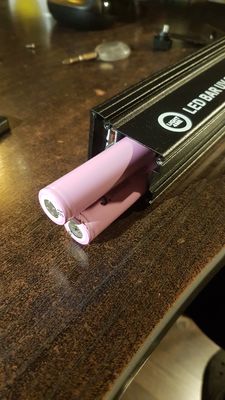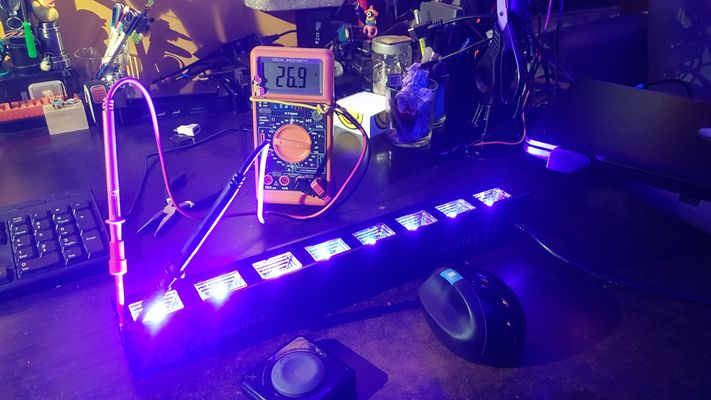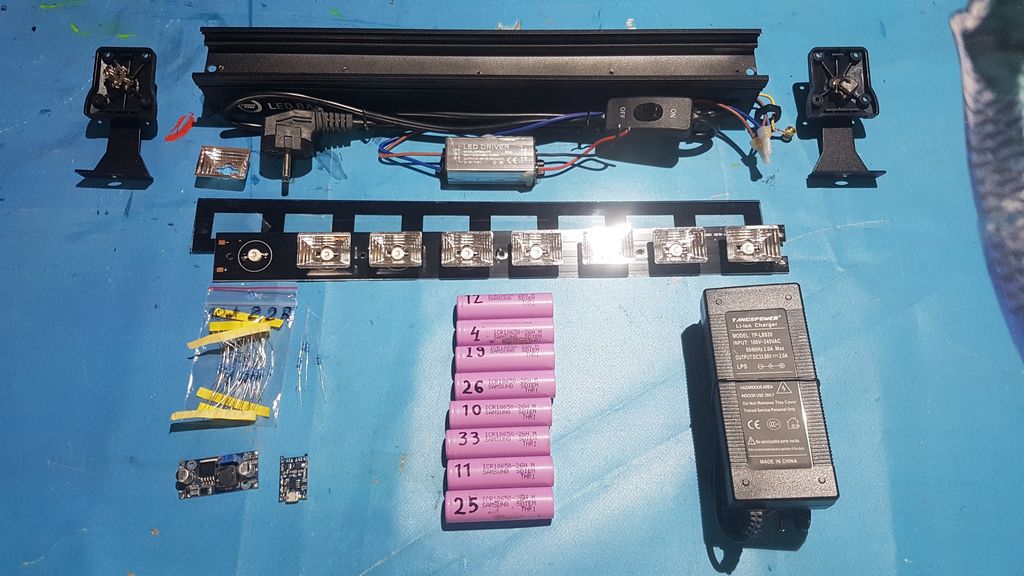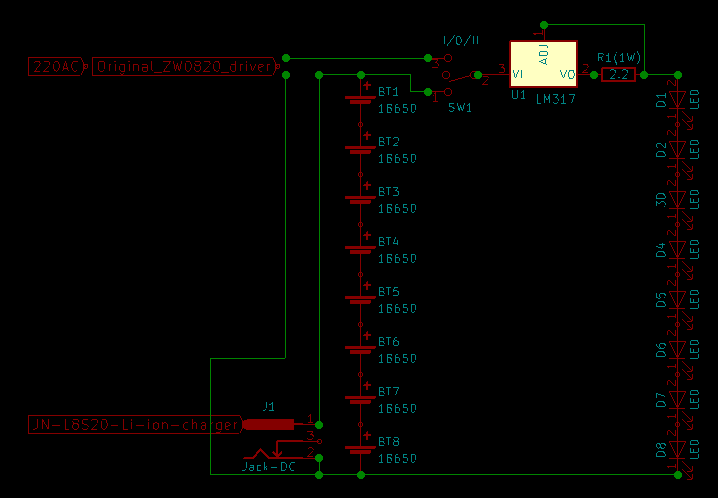| portable-led-bar | |
|---|---|
| Status | active |
| Founder | lepi |
| Source | lepi00/portable-led-bar |
DISCLAIMER:
This is not yet a finished project intended as instructions but only a means to share progress on the project.
This might be dangerous to attempt !!!
If you attempt to follow any of this, you do it at your own risk.
Adapting a mains AC led bar to work with a battery of 18650s
by lepi(lepi at-a hackerspace.pl)



KiCAD files:
https://github.com/lepi00/portable-led-bar/tree/main/kiCAD-portable-led-bar
Intro
The purpose of this project is to adapt a 220AC UV LED-Bar to work with 18650 cells.
I have just started learning electronics, and my knowledge is very basic.
Specifications
The LED Bar - Light4Me LED UV 8
| Characteristic | Value | |
|---|---|---|
| Voltage: | AC110-240V, 50/60Hz | |
| Power: | 30W | |
| Light source: | 8x3W UV LED | |
| Light angle: | 65° | |
| Light wavelength: | 390-410 nm | |
| Dimensions: | 450 x 50 x 40 mm + 55 mm pins | |
| Weight: | 0,6 kg | |
| LED driver inside (IP65): | ||
| Model: | ZW0820 | |
| Power: | 27 W | |
| Input: | AC85V-265V 50/60Hz | |
| Output Voltage: | 27-36V DC | |
| Output Current: | 600 mA ±5% | |
| TA: | 60 °C | |
| TC: | 80 °C |
18650 Cells
| Characteristic | Value | |
|---|---|---|
| Datasheet: | (https://www.tme.eu/Document/e06617d885c58dfb3fecaf4abbe330c4/ICR18650-26H.pdf)[“datasheet”] | |
| TME Symbol: | Samsung ACCU-ICR18650-26H | |
| Rated voltage: | 3.63 V | |
| Capacity: | 2.6 Ah | |
| Maximum current: | 5.2 A | |
| Charging Method: | constant voltage, limited current | |
| Charging Voltage: | 4.2 V ±0.05 V | |
| Charging Current (standard): | 1300 mA | |
| Charging Current (max): | 2600 mA | |
| Diameter: | 18.4 mm | |
| Length: | 65 mm |
Battery charger - Tangspower TP-L8S20 Li-ion charger
| Characteristic | Value | |
|---|---|---|
| Maximum Voltage: | 8 * 4.20 V = 33,6 V | |
| Charging Current: | 2 A | Passive, PFC filter |
The Story
Revision 0.1
A friend of mine performs POI with POI-tails that are neon-yellow. The thing is made to shine in UV light.
Some AC mains LED bars I have, revealed a lot of space inside the casing profile - more than enough to house 8 18650 cells.
The LEDs have a “PowerLed” package soldered in-series upon a pcb with no other elements, but most likely have some resistor inside the package, as multimeter LED tester does not show anything when testing a single LED.
Remembering next-to-nothing about Electrical Circuits, I started designing a circuit, that would:
- Power the LEDs from cells
- Allow charging the cells without taking them out
- If possible leave the original charger with mains connection
First I considered two solutions: - LEDs and cells in parallel
- Operating current would be 0.6 A * 8 = 4.8 A
- Charging current would be 1.3 A * 8 = 10.4 A
- LEDs and cells in-series
- Operating voltage would have to be 26.9 V (3.36 V / LED)
- Charging voltage would have to be 8 * 4.2 V = 33.6 V
Parallel...
- I have a TP4056 03962A Lithium Battery Charger with protection module
- Initially I thought that would be crazy to put 8 of these inside
- Also wiring LEDs in parallel would if I understand correctly require to put at least 40 cm * 8 = 3.2 m of thick wire - that might be difficult.
In-series...
- A friend informed me to the fact, that I could use an external 33.6V charger which seemed to be easier.
- And also that I could use LM317 to regulate current out of the cells to LED's
- I decided to use a I/0/II switch and an IEC cord socket with the original LED driver if possible.
Emeryth suggested:
- to learn more about li-ion cells before I use un-protected or multiple cells
- to put some protection between cells and the cell charger
- to use a DC-DC converter instead of LM317 that produces too much heat
- to rethink if I need all LEDs in-series
Next Steps:
- Research Emeryth's suggestions
- Find a solution to connecting the cells
- decide whether to solder the cells (dangerous, potentially capacity hindering)
- contact weld the cells (I don't have access to a contact welder)
- design a 3d-printed casing for the cells with springs, that would slide into the LED bar casing
- remember to discharge cells before in case of soldering
Notes:
- https://pl.aliexpress.com/item/1000001962896.html
- https://lcamtuf.coredump.cx/electronics/
